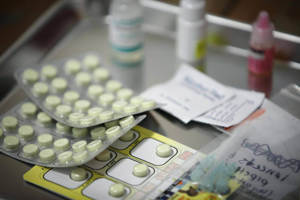Courtney CarsonGHTC
Courtney Carson is a policy and advocacy officer at GHTC, who leads GHTC's US advocacy portfolio.

In November 2015, United Nations (UN) Secretary-General Ban Ki-moon convened a High-Level Panel on Access to Medicinesto discuss and develop solutions to promote innovation and access to essential medicines, vaccines, diagnostics, and other health technologies needed to ensure health and well-being around the world. This panel comes on the heels of the UN General Assembly formally adopting the Sustainable Development Goals (SDGs)—goal three of which is to “ensure healthy lives and promote well-being for all at all ages”—and is designed to consider ways in which intellectual property (IP) protections, trade rules, and international human rights law might affect global access to medicine and the ability of the international community to achieve SDG three by 2030.
The panel also comes at a time when the United States and the international community are considering one of the most ambitious trade agendas in the last several years. The Trans-Pacific Partnership (TPP), the largest regional trade agreement in history, linking 11 Pacific-rim countries that make up 40 percent of the world’s economy, was finalized in October 2015 and is currently under review by the US Congress. The agreement has stronger IP protections for pharmaceutical products than those included in previous regional and bilateral trade agreements—including twelve years of data protection for new biologics and the ability to evergreen certain pharmaceutical patents—which may impact timely access to generic medicines in TPP countries. The US is also in the process of negotiating the Trans-Atlantic Trade and Investment Partnership (TTIP), which would reduce tariffs and codify trade-related standards between the United States and the European Union. Details of this agreement have not yet been made public. (To read more about the potential impact of TPP on access to medicine, visit GHTC’s blog .)
Though minimum standards for patents and IP protections have been included in trade agreements since 1995, when the Agreement on Trade-Related Aspects of Intellectual Property Rights (TRIPS) was approved by the World Trade Organization (WTO), certain actions have carved out exceptions to protect public health and support low- and middle-income countries. The Doha Declaration on TRIPS and Public Health formally clarified that TRIPS IP protections for pharmaceuticals should not prevent countries from protecting public health and promoting access to medicine. It also affirmed flexibilities for least developed countries (LDCs), as designated by the UN, to gradually enforce IP protections for pharmaceuticals, including provisions around compulsory licensing of generic medications, and established January 1, 2016, as the deadline for LDCs to implement enforcement of pharmaceutical patents. The US May 10th Agreement established congressional intent for TRIPS flexibilities, as expressed in the Doha Declaration, to be reflected in all US trade negotiations.
With the on-ramp for LDCs to enforce pharmaceutical patents set to expire at the start of the new year, in November, the WTO committee on IP rights agreed to extend the provision allowing LDCs to avoid applying and enforcing IP rights on pharmaceutical products until 2033. In a June 2015 letter to the WTO, advocates argued that, “Many LDCs (at least 25 countries) have relied on the…pharmaceutical product [exemption] to declare patents unenforceable as well as to exempt pharmaceutical products from patent and test data obligations, thereby allowing them to import critical treatments such as medicines for their national HIV and AIDS treatment programs” at affordable prices. Because “the public health crisis in LDCs is a long-term challenge that will endure at least as long as these countries remain LDCs,” an extension of the on-ramp is critical to “provide suppliers, procurers and donors of affordable medicines in LDCs the clarity and certainty to confidently manufacture, export and import generic medicines.” Countries with strong pharmaceutical industries, like the United States, negotiated to make the extension time-bound to 2033 in lieu of the permanent extension sought by LDCs and their advocates.
It is with this backdrop that the UN High-Level Panel on Access to Medicines begins its work. The UN Secretary-General has appointed members of the panel—with representatives from both developed and low- and middle-income countries. Further, a group of expert advisors—from civil society, the private sector, and academia—has been established to help guide the Panel’s work. Several documents including a Report on HIV and the Law are cited as background for the Panel’s work. After the first in-person meeting of the panel in December, the group opened a call for contributions by interested stakeholders “that address the misalignment between the rights of inventors, international human rights law, trade rules and public health where it impedes the innovation of and access to health technologies.” The panel will discuss these contributions at two public hearings in March, which will help to guide the development of their formal report to the Secretary-General, expected to be finalized in early June.
To ensure that essential global health technologies get into the hands of populations in need, promoting access to medicines and global health tools is just as critical as supporting the research and development that drives these new innovations. GHTC will be closely monitoring the work of the High-Level Panel and looks forward to contributing to the public hearings in March.